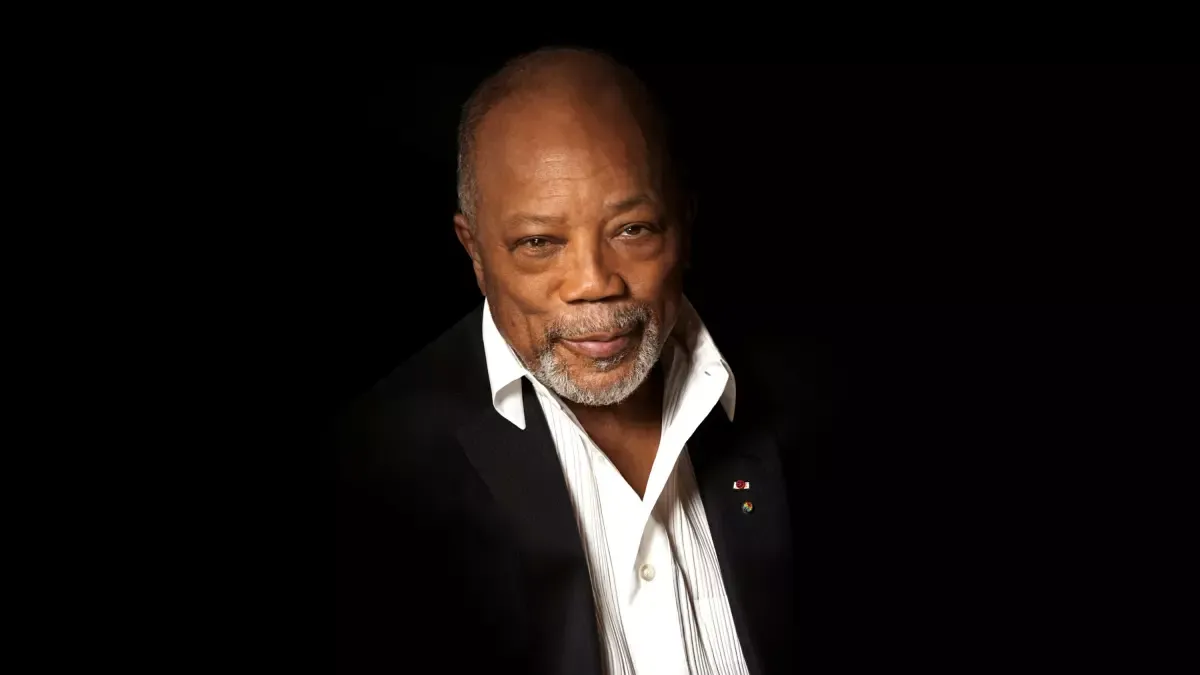Quincy Jones, the legendary music producer, arranger, and composer, left a profound impact on the entertainment world. With a career that spanned over 70 years, he produced more than 2,900 songs and 300 albums, writing over 1,000 original compositions. His musical genius earned him 28 Grammy Awards, second only to Beyoncé in popular music. Beyond music, he co-founded Vibe magazine and collaborated with countless iconic artists.

Let’s explore 10 fascinating facts that truly capture Quincy Jones’ essence and his remarkable journey.
Early Life and Musical Beginnings
Born on March 14, 1933, in Chicago’s South Side, Quincy was raised in a family that faced many challenges. His parents, Sarah Frances Wells and Quincy Delight Jones Sr., supported him through some tough times. Despite early hardships, Quincy found solace in music. By playing the piano, trumpet, and percussion, he discovered his life’s passion.
Growing Up in Chicago’s South Side
Quincy’s childhood was marked by adversity. At seven, his mother was hospitalized, leading his father to relocate the family to Bremerton, Washington, in 1943. But the challenges didn’t deter Quincy; instead, they fueled his dream to make music his life.
First Musical Influences
When Quincy was just 14, he met a young Ray Charles, who would later become a lifelong friend and major influence. Their connection inspired Quincy to pursue music even more seriously, driving him to perfect his craft.
Educational Journey
Quincy earned a scholarship to Seattle University, where he crossed paths with Clint Eastwood, another music major. This college experience shaped his vision for a future in music and reinforced his dedication.
Also Read: Beloved ‘Days of Our Lives’ Star Drake Hogestyn Passes Away at 70: Remembering His Iconic Legacy
The Journey to Stardom
Quincy’s journey to fame highlights his extraordinary talent and unyielding determination. Starting as a trumpeter, arranger, and pianist, he quickly made a name for himself. He toured with Lionel Hampton and later moved to New York City, where he worked with legends like Sarah Vaughan and Ray Charles. Quincy studied in Paris with Nadia Boulanger, arranging over 200 sessions and showcasing his immense skill.
Returning to New York, Quincy joined Mercury Records and produced hits for artists like Lesley Gore, cementing his reputation as a top producer.
| Quincy Jones’ Key Facts | Achievements |
|---|---|
| Grammy Awards | 28 wins out of 80 nominations, one of the most awarded musicians in Grammy history |
| Jean Hersholt Humanitarian Award | Received from the Oscars in 1995 for his charitable efforts and impact |
| “We Are the World” | Produced the iconic single, which sold over 20 million copies and raised millions for famine relief |
Quincy’s rise to prominence was unique, blending genres and collaborating across artistic disciplines. His contributions to film, TV, and philanthropy made him a true cultural icon.
The Power Behind Multiple Music Legends

Quincy had an immense impact on the music industry, working with some of the most celebrated artists and shaping the trajectory of their careers. His collaboration with Frank Sinatra, for instance, led to iconic hits like Fly Me to the Moon, a song that even made it to space with the Apollo 10 mission. His bond with Sinatra spanned years, creating timeless music.
Perhaps one of his most famous collaborations was with Michael Jackson. Producing Jackson’s Off the Wall, Thriller, and Bad albums, Quincy played a pivotal role in making Thriller the best-selling album of all time.
| Notable Collaborations | Achievements |
|---|---|
| Frank Sinatra | Produced hits like Fly Me to the Moon |
| Michael Jackson | Produced Off the Wall, Thriller, and Bad |
| Other Artists | Worked with Louis Armstrong, Tony Bennett, Ray Charles, Ella Fitzgerald, Aretha Franklin, and Donna Summer |
| Grammy Awards | Received 80 nominations, winning 28 times |
Quincy’s unique talent brought out the best in every artist he worked with, producing music that continues to inspire.
Record-Breaking Achievements in Music Production
Quincy produced the groundbreaking charity single We Are the World in 1985, raising millions for African famine relief. His role in creating Michael Jackson’s Thriller further underscored his musical genius; Thriller sold over 70 million copies worldwide. His extensive career earned him awards including 28 Grammys, a Primetime Emmy, and a Tony, making him the only person to win Grammys in six decades.
Personal Life and Family Dynamics
Quincy’s life was as rich and complex as his music. Married three times, he had seven children with five different women. His children, including The Office star Rashida Jones and fashion model Kenya Kinski-Jones, inherited their father’s creative spirit. The Jones family legacy continues to inspire across various fields.
Groundbreaking Work in Film and Television
Quincy didn’t just stop at music; he became a major force in film and TV as well. In the 1960s, he composed scores for films like The Pawnbroker and In Cold Blood, receiving multiple Oscar nominations. Perhaps his biggest film project was The Color Purple (1985), which he co-produced with Steven Spielberg. In television, Quincy created The Fresh Prince of Bel-Air and wrote the theme for Sanford and Son.
Business Ventures and Entrepreneurial Success
Quincy’s media empire began with Qwest Records in 1980. In 1993, he launched Vibe magazine, an essential publication for hip-hop and R&B fans. By selling Quincy Jones Entertainment to Time Warner for $270 million in 1999, Quincy solidified his status as a savvy entrepreneur.
Awards, Accolades, and Cultural Impact

Throughout his life, Quincy was celebrated for his contributions to American culture. He earned the Kennedy Center Honors, National Medal of Arts, and the Rock and Roll Hall of Fame’s Ahmir Ertegun Award. Quincy’s legacy as a pioneer in music and film will undoubtedly inspire generations to come.
| Award or Accolade | Year | Significance |
|---|---|---|
| 28 Grammy Awards | Multiple Years | One of the most awarded musicians in Grammy history |
| Kennedy Center Honors | 2001 | Honored for contributions across genres |
| National Medal of Arts | 2011 | Recognized his influence on culture |
| Rock and Roll Hall of Fame | 2013 | Honored for his impact on music history |
| Jean Hersholt Humanitarian Award | 1995 | Recognized his philanthropy |
Net Worth and Financial Legacy
Quincy’s financial success was as remarkable as his creative legacy. With an estimated net worth of $500 million, his wealth came from record sales, royalties, and business ventures. His investments in real estate, including his 25,000-square-foot Bel Air home, further added to his wealth.
Even after his passing, Quincy Jones’ music, influence, and legacy will continue to resonate across the world. His story reminds us of the power of talent, hard work, and dedication to one’s craft.
Quincy’s life is a powerful testament to the transformative impact of music, innovation, and resilience. From Chicago’s South Side to the heights of global stardom, his journey is an inspiration for artists, dreamers, and all those who seek to make a difference. His legacy will live on as a true icon of our time
Read More About The Late Star from Latimes Website Here: Quincy Jones, in his own words for the L.A. Times: ‘If it can’t get funky, brother, you don’t touch it’
